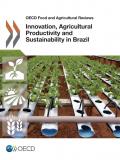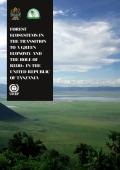This scoping study provides ideas, techniques and case studies on how renewable energy can be better communicated to and by policy makers, decision makers and other stakeholders. It examines 15 case studies of renewable energy communications strategies from government, the private sector, and civil society. The majority of cases were found to lack rigorous, well-planned and adequately evaluated communications strategies. The study looks at how more targeted, effective renewable energy communications campaigns can be achieved through the use of more consistent, holistic and rigorous approaches to pre- and post-campaign development.

Agriculture and the agro-processing sector in Brazil have shown impressive growth over the past two decades. This has largely been driven by productivity improvements and structural adjustment resulting from broad economic reforms, as well as new technologies developed by agricultural science. Government policy and industry initiatives are increasingly focused on the sustainability of agricultural development.
The electricity system in Turkey faces three challenges. First, demand for electricity is growing as economic growth brings increased energy usage. Second, as the electricity supply expands to keep pace with demand there is the need to ensure that electricity prices remain affordable. Third, as energy and electricity are at the heart of modern economies, energy security is critical for the electricity sector. To balance the competing demands of demand growth, affordability and energy security, policy must seek to create a framework that promotes technologies and projects that meet these needs and deliver sustainable development.
Every year governments spend $543 billion subsidising fossil-fuels to consumers. A new report on Fossil-Fuel Subsidies and Climate Change for the Nordic Council of Ministers from the IISD finds that removing these subsidies to consumers and society could lead to global GHG emissions reductions of between 6-13% by 2050.
With potential domestic savings to some government of between 5-30% of expenditures, and in the context of the low oil price many governments are removing subsidies. This report shows how to include national emissions reduction estimates within country contributions towards the UNFCCC using the Global Subsidies Initiative – Integrated Fiscal (GSI-IF) model.
This report discusses the current situation of the energy efficiency sector in India, delves into some of the causes hindering the development of this market and explains why the lack of commercial bank financing is one of the main barriers for attaining higher energy savings. The discussion then moves to proposing two innovative business models to overcome this funding barrier. The first model is a bespoke financing protocol that would serve as a blueprint for banks to reduce perceived risks, learn how to appraise energy savings as cash flows to back loans, and launch energy efficiency as a new credit line. The second proposal is a business model for energy efficiency deal aggregation as a viable strategy for banks to deleverage their balance sheet while creating a broader investor base for energy efficiency projects.
The cost of existing environment-friendly technologies, such as wind turbines and SO2 scrubbers, needs to be brought down so that they can be deployed on a large scale, while fundamental research needs to advance on the frontiers of technologies such as smart grids or energy storage.
Yet, despite these pressing challenges, European companies in the electricity production sector – the largest greenhouse gas emissions emitter in Europe, with 33% of European emissions in 2012 – spend less than 1% of their turnover on innovation, against 10-15% in IT or pharmaceuticals, suggesting that the incentives to conduct Research, Development and Demonstration (RD&D) of new or enhanced low carbon technologies and their associated systems and processes might not be in place.
The objective of this policy note is to investigate whether the current level of public support to environment-friendly technologies is sufficient to allow European countries to respond to the multiple challenges posed by climate change and other environmental concerns and to discuss the policy interventions that might be needed in order to drive forward clean energy technology investments in Europe.
To meet climate change targets, European Union (EU) countries need to significantly increase investment in carbon capture and storage (CCS) and show greater urgency to develop and deploy the technology. Installing 11 GW of CCS electricity generation in the EU by 2030, as envisaged by the EU Energy Roadmap, could cost between €18 and €35 billion. Current policies, including those envisaged by the 2030 framework for climate and energy and the emerging Energy Union, are unlikely to deliver this investment. Economic models indicate that CCS is crucial to the cost-effectiveness of Europe’s emissions reduction targets. CCS can provide flexible, mid-merit electricity generation, which will be much needed as the share of electricity from variable renewable sources increases. It is also, to date, the only technology that can help reduce emissions from industrial installations.

This paper has been developed to inform discussions on smart infrastructure development and financing as part of the sustainable development goals (SDGs) and climate processes in 2015. The article is designed to respond to five questions. First, why is a major increase in investments in better infrastructure essential to both development and climate goals? Second, what is holding back this investment? Third, how can the deployment of private capital into infrastructure investment be doubled? Fourth, what is the distinctive role of development banks in closing the infrastructure investment and financing gap? Fifth, how can official development assistance and climate finance reinforce each other?
This report, from the New Climate Economy, provides 10 practical recommendations to boost economic growth and reduce climate risk. These recommendations could deliver up to 96% of the emissions reductions required by 2030 to keep our planet on a pathway to keep global warming under 2 degrees celsius. And these are actions that would also deliver multiple economic benefits.
The report calls for stronger cooperation between governments, businesses, investors, cities and communities to drive economic growth in the emerging low-carbon economy. International and multistakeholder cooperation can scale up technological change, expand markets, reduce costs, address concerns about international competitiveness, spread best practice and increase the flows of finance.
